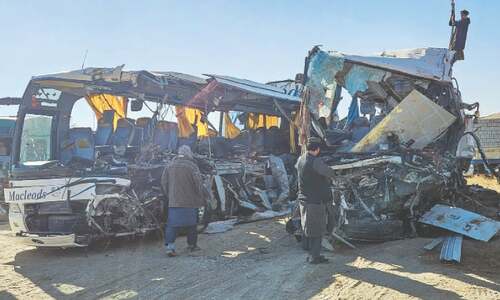GENEVA: The world is at a ‘dangerous moment’ in the fight against diseases like polio, a senior World Health Organisation official said, as efforts begin to immunise 23 million children across five African countries after an outbreak in Malawi.
In February, Malawi declared its first case of wild poliovirus in 30 years, when a three-year old girl in the Lilongwe district was paralysed as a result of her infection.
The case raised alarm because Africa was declared free of wild polio in 2020 and there are only two countries in the world where it is endemic: Afghanistan and Pakistan. Pakistan marked a year without cases in January.
“This is a dangerous moment,” Modjirom Ndoutabe, polio coordinator for WHO Africa, told Reuters in a phone interview from Brazzaville, the Republic of Congo.
“Even if there is one country in the world with polio, all the other countries are in big trouble.” Ndoutabe said the coronavirus pandemic and lockdowns had slowed efforts to vaccinate children against other diseases such as polio, and also hit surveillance.
According to the Gavi vaccine alliance, childhood immunisation services in the 68 countries it supports dropped by 4 per cent in 2020, representing 3.1 million more “zero-dose” children likely unprotected from childhood diseases like polio, diptheria and measles, and 3 million more under-immunised children than in 2019.
“This is a tragedy,” Seth Berkley, chief executive of Gavi, said in an interview with Reuters. “The challenge is getting that back up.” In Malawi, where polio vaccine coverage is high above 90pc in most districts rates during the pandemic fell by 2pc,” according to Janet Kayita, WHO Malawi head. She said the child who was paralysed had one dose of the polio vaccine at birth, but not the other doses needed for full protection.
Kayita said surveillance had been more significantly impacted. The case is linked to a strain circulating in Pakistan’s Sindh province in 2019, which means it does not impact Africa’s polio-free status. But teams are now scrambling to answer how it arrived in Malawi, and how long it spread undetected.
Polio, a highly infectious disease spread mainly through contamination by faecal matter, used to kill and paralyse thousands of children annually. There is no cure, but vaccination brought the world close to ending the wild form of the disease.
In a bid to prevent renewed spread in Africa, almost 70,000 vaccinators will go door-to-door in Malawi, Mozambique, Tanzania, Zambia and Zimbabwe, to give all children under 5 the oral polio vaccine in a $15.7 million campaign funded by the Global Polio Eradication Initiative, the WHO said in a statement on Friday.
The first round, beginning on Monday, will target more than 9 million children, followed by three further rounds aiming to reach all under-5 year olds, regardless of their vaccination status, to boost immunity, Kayita said.
Efforts have also been stepped up to track any cases linked to the Malawi outbreak and to monitor transmission in waste water. So far, no other linked cases have been found.
Published in Dawn, March 19th, 2022














































Dear visitor, the comments section is undergoing an overhaul and will return soon.